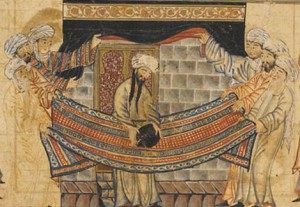I am not interested in living in a world where people feel they are justified in killing others simply because they’re offended.
Therefore, I am participating in Everybody Draw Mohammed Day. If you are offended by depictions of your prophet, I apologize, but I feel that the principle of freedom of religion is more important than not offending you. If you say that it’s only a few extremists who would want to kill people over this, then I say to you: clean your own house, then we’ll talk. If you’ll stand up in your mosque tomorrow and condemn violence against blasphemers, then we’ll talk.
The picture below is a miniature illustration on vellum from the book Jami’ al-Tawarikh (literally “Compendium of Chronicles” but often referred to as The Universal History or History of the World), by Rashid al-Din, published in Tabriz, Persia, 1307 A.D. It depicts Mohammed supervising the rebuilding of the Kaaba.
In other words, it’s an image of Mohammed drawn by a devout Muslim. There are many such images.
